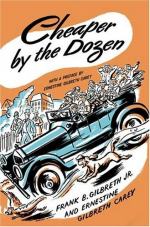
|
| Name: _________________________ | Period: ___________________ |
This test consists of 15 multiple choice questions and 5 short answer questions.
Multiple Choice Questions
1. What qualities about Mother are revealed in Chapter 7?
(a) She enjoyed socializing with others and often held parties for friends.
(b) She was a strong leader with a great sense of humor.
(c) She was a humble servant in the community and did not socialize very much.
(d) She was a stubborn woman, with firm beliefs.
2. In the Preface, what tactic does Ernestine use in her writing to get the point across?
(a) Detailed timeline of the birth of each child in the Gilbreth family.
(b) Poetry to make the writing rhythmic and engaging.
(c) Highly sophisticated language.
(d) Anecdotes to amuse the reader.
3. How did Dad respond when Bill played a practical joke on him?
(a) He was mad at first, but then saw the humor in it.
(b) He punished Bill.
(c) He forbade anyone in the house from playing practical jokes ever again.
(d) He immediately laughed and was proud of his son's sense of humor.
4. Which of the following is true of Mother's background?
(a) She came from a poor family in Connecticut.
(b) She had eleven siblings.
(c) She was a teacher.
(d) She came from a wealthy family in California.
5. What do we learn about Mother during the big family outing in the car?
(a) She was very easy-going, and shrugged off anything she didn't approve of.
(b) She could quietly, yet firmly stand up for herself.
(c) She had a great sense of humor.
(d) She supported Dad's antics.
6. What did Dad tell his family he had purchased, when really he had purchased a car?
(a) A horse.
(b) An airplane.
(c) A house.
(d) A puppy.
7. Whom did Dad pretend to be after a woman commented about the children?
(a) The leader of a group of circus performers.
(b) A policeman who was taking a group of undisciplined children to an orphanage.
(c) A benevolent superintendent who was taking a group of orphans out for the day.
(d) A teacher who was taking children on a field trip.
8. What does Chapter 3 demonstrate about Dad's relationship with Mother?
(a) Dad did not respect Mother, because their points of view were so different.
(b) Mother always supported Dad, even if she didn't like something he was doing.
(c) Dad and Mother disagreed often.
(d) Dad respected Mother, and yielded to her wishes when she asserted herself.
9. Why is Chapter 5 entitled "Mister Chairman"?
(a) Dad enforced a new rule that the children must call him Mister Chairman instead of Dad.
(b) Bill told Dad he wanted to be called Mister Chairman when he is grown up and successful in business.
(c) Mother and Dad ran the household like a business, and Dad was the Chairman.
(d) Martha wanted to be respected like the boys, and she told everyone her new name was Mister Chairman.
10. Which is an example of how Mother and Dad allowed the children to have a say in the running of the household?
(a) Mother and Dad spoke with each child individually to give them a chance to share their ideas.
(b) The children proposed purchasing a different rug from what Mother chose, and she concurred.
(c) The children were allowed to develop two household rules.
(d) The children were allowed to veto anything which did not seem fair.
11. What comment did one woman in particular make about the children?
(a) The children were probably greedy and undisciplined.
(b) The children looked hungry.
(c) The children appeared to be very well-behaved.
(d) The poor children looked adorable in their uniforms.
12. When people questioned why the car was so crowded with children, how did Dad respond?
(a) He said that if it would have been cheaper to purchase a dozen cars, then he would have done so.
(b) He angrily told them to mind their own business.
(c) He jokingly said that the dozen children were for sale, and cheaper if they bought the car too.
(d) He cheerfully informed them that children come cheaper by the dozen.
13. What did Mother do on the road trip, which the children loved and Dad admired?
(a) She allowed the children to break some of the usual rules.
(b) She told the children stories about the things they were observing.
(c) She made up songs about the things they were observing.
(d) She helped them find their way home when they got lost.
14. Although Mother and Dad were a great team as parents, in what area did they disagree?
(a) The children's education.
(b) Rewarding the children.
(c) The children's sleep habits.
(d) The children's religion.
15. What influence did Dad's work life have on his home life?
(a) He analyzed the inner workings of his household to establish optimal time management techniques.
(b) He was always serious at home, so the children would know he was in charge.
(c) He wanted all of the children to become engineers one day.
(d) He never mixed the two because they were so different.
Short Answer Questions
1. Which of the following is an example of how Dad strived for efficiency in his life?
2. Which of the following was true about Dad's driving?
3. According to Ernestine, which of the following statements is true about the popularity of the book, "Cheaper by the Dozen"?
4. What method did Dad use with the children to reinforce that they work hard in school?
5. The children joined together to vote for __________.
|
This section contains 983 words (approx. 4 pages at 300 words per page) |

|




